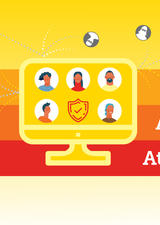IT Security
UCalgary is offering annual required cybersecurity and privacy awareness training for all faculty and staff, and annual required research security training for those who perform and/or support research.
Steps for Reporting
Important note: Online sexual exploitation of children must be immediately reported to the Calgary Police Service. You may also report crimes of this nature anonymously to the Canadian Centre for Child Protection.
Shared Computing
A shared computer is used by more than one person, either at the same time (such as a timesharing system) or at different times (like a workstation in the office or lab).
Security is more difficult to maintain when utilizing shared systems because the safety of technology depends on the trust people have in each other and on whether the system/computer is correctly configured and secure.


Cybercriminals are Clever.
Use every opportunity to protect yourself.
Cybercriminals can use your information to access and re-access your accounts if you do not update, change and remove all previous account recovery information.

Cybersecurity in a Nutshell
Cybersecurity is the practice of protecting systems, networks and programs from digital attacks that are usually aimed at accessing, changing, or destroying sensitive information.
Privacy and FOIP
Since 1999, the Freedom of Information and Protection of Privacy Act has applied to local public bodies such as school boards, health authorities, and post-secondary educational institutions, including the University of Calgary.
The University and all of its staff members have both rights and obligations under FOIP. Learn more about UCalgary's Information Security Data Classification Standard
If you are working with Level 3: Confidential or Level 4: Restricted data:
- Engage IT or Research Computing Services for support
- Contact Privacy/FOIP office for support
Visit our Social Media Awareness page for more information about protecting yourself online.
In the News

Not your grandma’s rich prince email scam
How to spot the subtle clues you’re being targeted by a phishing attack.

UCalgary offers 2 new cybersecurity courses for researchers
Half-hour courses teach researchers how to protect themselves and their data from cyberattacks.

Ransomware spreads among unprotected populations...
Ransomware spreads among unprotected populations but product pricing may help prevent proliferation.
Haskayne researcher explores the relationship of ransom amount and risk and its impact on vendor and consumer decisions.

What’s in your cybersecurity tool kit?
Cybersecurity is important in helping everyone stay safe online — at home and on campus. It’s important to learn how to protect ourselves, our colleagues and our communities from hackers and fraudsters.

Cybersecurity: How do you know if you’re infected?
Knowing how to avoid cybersecurity threats is only half the battle. What if you’re already infected? How would you know if you were?

Keep your electronic devices up-to-date and save yourself a lot of heartache
Webinar highlights tips to stay cybersecure at home and at work.












